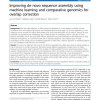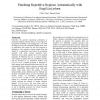37 search results - page 2 / 8 » Assembly of Large Genomes from Paired Short Reads |
BMCBI
2010
13 years 5 months ago
2010
Background: With the rapid expansion of DNA sequencing databases, it is now feasible to identify relevant information from prior sequencing projects and completed genomes and appl...
BIOCOMP
2006
13 years 6 months ago
2006
Currently, the genome sequencing community is producing shotgun sequence data at a very high rate, but genome finishing is not keeping pace, even with the help from several automa...
BMCBI
2010
13 years 5 months ago
2010
Background: We propose a method for deriving enzymatic signatures from short read metagenomic data of unknown species. The short read data are converted to six pseudo-peptide cand...
BMCBI
2010
13 years 5 months ago
2010
Background: Metagenomics is the study of environmental samples using sequencing. Rapid advances in sequencing technology are fueling a vast increase in the number and scope of met...
BMCBI
2010
13 years 5 months ago
2010
Background: Finishing is the process of improving the quality and utility of draft genome sequences generated by shotgun sequencing and computational assembly. Finishing can invol...



